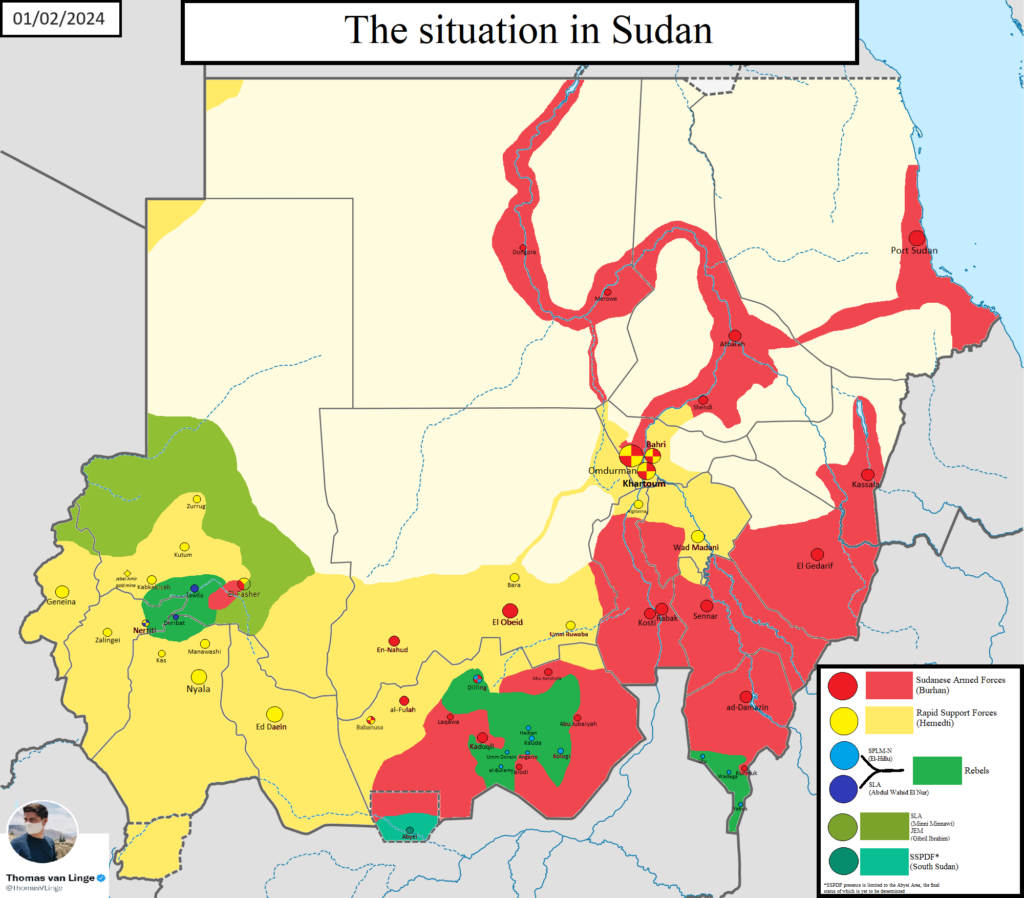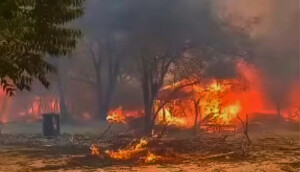Renewed battles between Sudan army and RSF reported in North Darfur capital

Military control in Sudan as of February 1, approximate (Map by Sudan War Monitor)
At least four people were killed and 14 wounded yesterday in renewed clashes between the Sudan Armed Forces (SAF) and the Rapid Support Forces (RSF) in El Fasher, capital of North Darfur, after days of relative calm. Residents of the city fear that rebel combatants may be drawn into the fighting.
The health centre of the El Gubba neighbourhood, in the northeast of the city, received a number of injured people, including children, as a result of the fighting that continued the entire morning, the El Fasher Resistance Committees reported.
In a statement on social media, they confirmed the death of four people, including a mother and her child, when missiles hit the Grand Market and surrounding houses.
A commander of the Darfur Joint Protection Force told Radio Dabanga that SAF troops advanced on RSF positions northeast of the El Fasher army command.
The RSF said that they repelled an attack by the army in the city, captured a number of SAF officers and soldiers, and inflicted heavy equipment losses to the army.
In a press statement yesterday, they accused the army of using camps for the displaced and densely populated neighbourhoods in El Fasher as human shields, “in attempts to drag our forces into battle in the middle of residential neighbourhoods”.
The statement said that the RSF “have been exercising restraint throughout the past period to prevent endangering the lives of civilians, in compliance with the initiatives put forward by native administration* leaders and many other parties to spare the city of El Fasher of war and destruction”.
Joint rebel force
Journalist Shamayel El Nour told Radio Dabanga yesterday that she does not rule out the entry of armed rebel movements into the battles alongside the army fighting attacks of the RSF in El Fasher “under the umbrella of protecting civilians.
“If any of the parties attempts, and the army is unlikely to do so, so if the RSF tries to harass the armed struggle movements in El Fasher or accidentally injures one of their fighters, it will prompt the rebel forces to fully intervene, as they are prepared for such an eventuality.”
The Darfur Joint Protection Force, made up of fighters of the Sudan Liberation Movement faction led by Darfur Governor Minni Minawi (SLM-MM), the Justice and Equality Movement (JEM), and smaller rebel factions that signed the Juba Peace Agreement (JPA) with the Sudanese government in October 2020, have repeatedly stressed that they will not allow the RSF to seize El Fasher and that they are there to protect the city’s residents.
This may prompt the RSF to deal with members of the joint protection force that has its headquarters in in El Fasher as if they are part of the SAF, El Nour warned, “unless there are groups within these movements that disagree with the rhetoric of their politically oriented leaders”.
Radio Dabanga in November last year reported about fears that rebel combatants will get involved in the fighting. Journalist Malik Dahab said that the RSF and the armed rebel groups do not want to fight each other because it will be the end of one of them. “The North Darfur capital is the last card for the rebel movements,” he said. “If they lose the fight, they will fade away, as the movements look at the North Darfur capital as the only shelter where they exist as movements that signed the Juba Peace Agreement”.
Moreover, people in El Fasher have warned that the RSF taking full control of the city would reportedly also ignite strife between the Arab tribes supporting the RSF, and the Zaghawa tribe, from which most fighters of the SLM factions and the JEM hail. Zaghawa leaders have allegedly contacted Chadian President Mahamet Deby, also a Zaghawa, and asked him to intervene to convince the RSF not to enter El Fasher, to avoid a “catastrophic bloodbath” in the area.
Last year, the RSF took control of the capital cities of the other Darfur states, Nyala and Zalingei in end October, and El Geneina and Ed Daein a month later. SAF-RSF fighting had already occurred in El Fasher, but the governor of the state, a former rebel leader, managed, together with native administration leaders, civil society activists, police officers, and women and youth groups to make the warring parties agree on a ceasefire and extend it more than once in the state.
* The Native Administration was instituted by British colonial authorities seeking a pragmatic system of governance that allowed for effective control with limited investment and oversight by the state. The state-appointed tribal leaders also took on new responsibilities for executing policies, collecting taxes, and mobilising labour on behalf of the central government. According to the Darfur Bar Association, the Native Administration during the 30-year rule of dictator Omar Al Bashir (1989-2019) did not represent the real community leaders.











 and then
and then